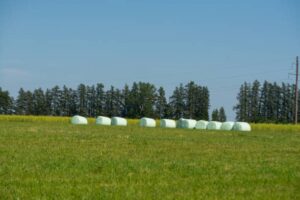Dairy farmers are concerned about the amount of plastic waste on their farms. They believe it takes too long to recycle non-packaging agricultural plastics.
Single-use 5-mil black and white plastic tarps are used to cover silage bunkers. However, these tarps are not recyclable and can end up in landfills. For more information about the silage plastic collection 2023, click here.
Recyclable
 If you are a farmer, your farm likely uses plastic products, including silo bags, bunker silo covers, and bale wraps. These products are a valuable, energy-rich resource that should be recycled rather than burned or buried on the farm. However, finding a safe and reliable way to recycle these products has been difficult for many farmers. Thankfully, Minnesota now offers a recycling program for these types of products. This is a joint effort between solid waste and recycling professionals, dairy producers, greenhouse owners, and environmental agencies.
If you are a farmer, your farm likely uses plastic products, including silo bags, bunker silo covers, and bale wraps. These products are a valuable, energy-rich resource that should be recycled rather than burned or buried on the farm. However, finding a safe and reliable way to recycle these products has been difficult for many farmers. Thankfully, Minnesota now offers a recycling program for these types of products. This is a joint effort between solid waste and recycling professionals, dairy producers, greenhouse owners, and environmental agencies.
Agricultural plastics, or “ag plastics”, are a wide range of flexible products made from different plastics. They include low-density polyethylene (LDPE) and low linear-density polyethylene (LLDPE) film, used to make silage and haylage bags, bunker silo covers, greenhouse covers, bale wrap, mulch film, and woven tarps. They also include high-density polyethylene (HDPE), polystyrene (PS) film, and rigid plastics used in pesticide containers and nursery pots.
The Irish Farm Film Producer’s Group (IFFPG) is a government-approved scheme for collecting and recycling waste farm plastics. The project is funded by a levy on all farm plastics on the market and a weight-based collection charge for farmers. The IFFPG collects most farm plastics at bring-centres, one- or two-day collection events held at marts and co-ops throughout the year. Farmers can also deliver their waste farm plastics directly to IFFPG’s collection facilities.
Last year, Ireland recycled enough farm plastics to wrap 18 million silage bales. This figure is up 40% over the previous year, reflecting a strong commitment by farmers to recycling. The IFFPG said that this increase was due to increased awareness of the benefits of recycling, the availability of bring centres and a cost-effective collection fee.
The IFFPG collects ag plastics at bring-centres located all over the country. Farmers can bring their ag plastics to these centres in containers, such as bins or bags. They can also transport them to the centre in pickup trucks, wagons, or dumpsters. These containers must be adequately sealed to prevent contamination. For more information about the silage plastic collection 2023, click here.
Reusable
Agricultural plastics are used for various purposes, including silage bunker coverings. Most of these plastics are not recyclable, and many end up in landfills. However, there are ways that farmers can use these plastics again. These methods can reduce their environmental footprint and protect their bottom line. The key is to prioritise sustainability and invest in reusable materials. These investments will pay off in the long run by reducing their waste.
A new reusable silage plastic collection scheme has been launched in Ireland to help farmers recycle their agri-plastics. Farmers can participate by bringing their used farm plastics to an organised bring centre. This will allow them to earn a gate fee that they can use to cover the cost of their next roll of silage plastics.
In the past, farmers have thrown away their used plastic sheets after one use. These sheets are usually not recycled and end up in landfills, where they take anywhere from 20 to 500 years to decompose. However, these plastics can be reused for other purposes if recycled into new products. This is an essential step in promoting sustainable agriculture practices.
Agricultural plastics can be made from a variety of plastic types, including low and low linear density polyethylene (LDPE and LLDPE), high-density polyethylene (HDPE) and polypropylene (PP). These are common plastics in producing tarpaulins, woven covers, mulch film and bale wrap. They are also used as linings for silage clamps and greenhouses.
Dairy farmers in the UK have been adhering to the mantra “reduce, reuse and recycle” for their plastic usage, particularly for silage production. This has led to a reduction in their overall plastic usage. However, this has not been without challenges.
Many dairy farmers are struggling to find solutions to their used plastics problem. Most of these plastics are non-recyclable and can be toxic to the environment if not disposed of correctly. These plastics are discarded or burned, producing dioxins and other pollutants. They can also be buried in fields or dumped in a remote location on the farm.
Reduced Carbon Footprint
Plastic is an essential material for many agricultural applications, including silage covers. Using these covers helps preserve silage, reducing the energy required to make the crop palatable for livestock. But these covers are usually single-use, which leads to pollution when they are discarded. However, new technology is reducing the environmental impact of these covers. For more information about the silage plastic collection 2023, click here.